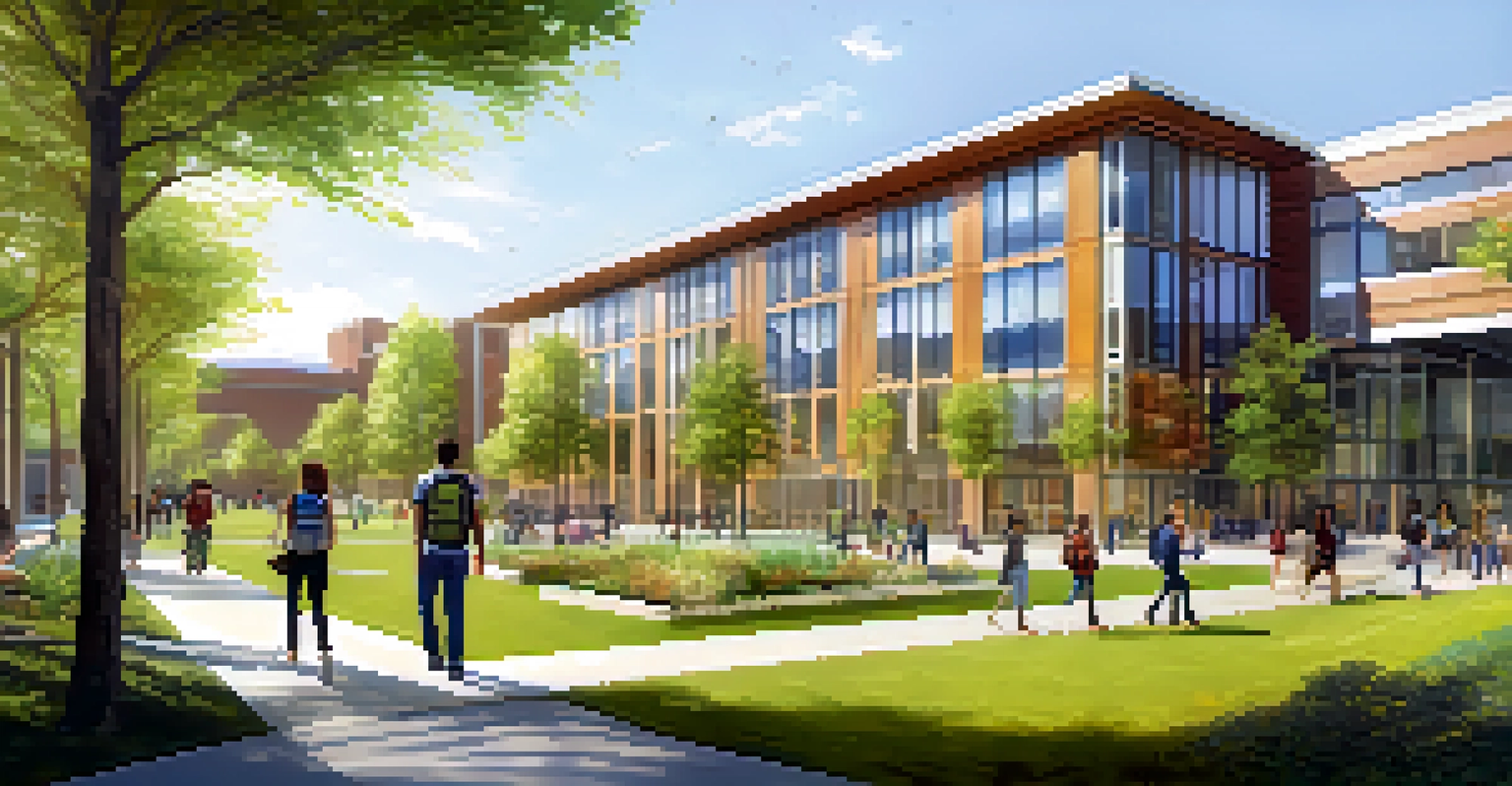Recent Developments in Higher Education Institutions in Nevada

Expansion of Online Learning Programs in Nevada
In recent years, Nevada's higher education institutions have significantly broadened their online learning offerings. This shift not only caters to non-traditional students but also enhances accessibility for those living in remote areas. For example, the University of Nevada, Reno has introduced multiple fully online degrees, allowing students to pursue their education from anywhere.
Education is the most powerful weapon which you can use to change the world.
The demand for flexible learning options has surged, especially post-pandemic, prompting colleges to innovate their online platforms. These programs often feature interactive components, such as virtual classrooms and discussion forums, fostering a sense of community among students. With this expansion, institutions are making strides to ensure that quality education is not limited by geographical constraints.
Additionally, the rise of online learning has encouraged partnerships between universities and tech companies to enhance digital resources. These collaborations aim to improve the overall learning experience, offering students cutting-edge tools and support. As Nevada continues to embrace this trend, we can expect ongoing improvements in online education.
Increased Focus on Career Readiness and Workforce Development
Nevada's higher education institutions are placing a stronger emphasis on preparing students for the job market. Colleges are collaborating with local businesses and industries to create programs that align with workforce needs. This proactive approach ensures that graduates possess the relevant skills and knowledge required by employers.

For instance, the Nevada System of Higher Education has launched several initiatives aimed at building career pathways for students. These programs often include internships, apprenticeships, and hands-on learning opportunities that provide real-world experience. By bridging the gap between education and employment, institutions are helping students transition smoothly into their careers.
Growth of Online Learning in Nevada
Nevada's higher education institutions are expanding online learning programs to enhance accessibility and cater to non-traditional students.
Moreover, universities are increasingly focusing on soft skills, such as communication and teamwork, which are crucial in today’s work environment. Workshops and seminars are being integrated into curricula to equip students with these essential attributes. As a result, graduates are not only knowledgeable but also adaptable and ready to thrive in diverse workplaces.
Innovative Research Initiatives at Nevada Universities
Research has taken center stage at many higher education institutions in Nevada, enhancing their reputations and attracting funding. Universities are investing in cutting-edge facilities and technologies to support innovative research across various fields. This commitment to research is vital for addressing both local and global challenges.
The only way to do great work is to love what you do.
For example, the Desert Research Institute focuses on environmental and water resource research, which is particularly relevant in the arid climate of Nevada. Their findings contribute to sustainable practices that benefit communities and ecosystems alike. Such initiatives not only advance academic knowledge but also promote public awareness of critical issues.
Additionally, universities are encouraging interdisciplinary research collaborations, allowing diverse perspectives to converge on complex problems. This approach fosters creativity and innovation, leading to breakthrough discoveries. As research continues to flourish, Nevada's institutions are positioned to make significant contributions to various sectors.
Strengthening Community College Pathways and Transfer Programs
Community colleges in Nevada are playing an essential role in the higher education landscape, providing accessible pathways for students. Recent developments have focused on enhancing transfer programs that facilitate smoother transitions from community colleges to universities. This initiative is aimed at increasing the number of students who complete their degrees.
For instance, Nevada's community colleges have established partnerships with universities to create clear articulation agreements. These agreements outline how credits transfer, ensuring that students don’t lose progress when moving to a four-year institution. As a result, students feel more empowered to pursue their academic goals without the fear of redundancy.
Focus on Career Readiness Programs
Colleges in Nevada are collaborating with local businesses to create workforce development initiatives that prepare students for the job market.
Moreover, community colleges are offering support services, such as academic advising and career counseling, to help students navigate their educational journey. By addressing the unique challenges faced by community college students, these institutions are fostering a more inclusive and supportive environment. This focus on accessibility is crucial for increasing overall graduation rates in Nevada.
Diversity and Inclusion Efforts in Nevada Higher Education
Diversity and inclusion have become core values for Nevada's higher education institutions, reflecting a commitment to creating equitable learning environments. Many universities are actively implementing policies and programs designed to support underrepresented students. This focus enhances the educational experience by fostering a broader range of perspectives.
For example, initiatives aimed at increasing enrollment among minority students often include scholarships, mentorship programs, and cultural awareness training. These efforts not only promote diversity on campus but also enrich the learning experience for all students. By embracing different backgrounds and viewpoints, institutions prepare graduates for a globalized workforce.
Furthermore, universities are establishing diversity councils that provide a platform for dialogue and feedback from the campus community. These councils play a pivotal role in shaping policies that promote inclusivity and equity. As Nevada's institutions prioritize these efforts, they are setting a standard for others to follow.
Investment in Campus Infrastructure and Facilities
Nevada’s higher education institutions are making substantial investments in campus infrastructure to enhance the student experience. Modern facilities equipped with advanced technology are becoming a hallmark of these institutions. This focus on infrastructure not only attracts prospective students but also supports current learners in achieving their academic goals.
For example, the University of Nevada, Las Vegas has recently unveiled new state-of-the-art laboratories and collaborative spaces designed for hands-on learning. Such environments encourage teamwork and innovation, crucial elements in today’s educational landscape. Improved facilities also play a significant role in promoting student engagement and retention.
Strengthening Community Partnerships
Higher education institutions in Nevada are forming partnerships with local communities to address educational needs and support economic development.
Moreover, sustainability is becoming a key consideration in campus development projects. Many institutions are incorporating green building practices and renewable energy sources, aligning their operations with environmental stewardship. As a result, Nevada's universities are not just investing in education but also in creating a sustainable future.
Emphasis on Mental Health and Wellness Programs for Students
Recognizing the importance of mental health, Nevada’s higher education institutions are increasing their focus on student wellness programs. These initiatives aim to provide support and resources that promote emotional and mental well-being. By prioritizing mental health, institutions are fostering a healthier campus environment conducive to learning.
For instance, many universities have expanded their counseling services and wellness resources to address the growing need among students. Programs such as stress management workshops, mindfulness sessions, and peer support groups are becoming commonplace. This comprehensive approach ensures that students have access to the help they need.

Furthermore, institutions are working to reduce the stigma surrounding mental health issues by encouraging open discussions and awareness campaigns. This cultural shift is essential for creating a supportive community where students feel comfortable seeking help. As Nevada continues to prioritize student wellness, we can expect positive impacts on academic performance and overall quality of life.
Collaboration Between Institutions and Local Communities
Collaboration between higher education institutions and local communities in Nevada is becoming increasingly vital. These partnerships aim to address community needs while enhancing educational opportunities for students. By working together, institutions can leverage resources to create impactful programs that benefit both parties.
For example, universities are engaging in outreach initiatives that provide educational resources and support to local schools and organizations. These efforts not only enrich the educational landscape but also foster a sense of civic responsibility among students. Such collaborations often result in community service projects that allow students to apply their knowledge in real-world contexts.
Moreover, these partnerships can lead to job creation and economic development within the community. By aligning academic programs with local industry needs, institutions prepare students for careers that will support the region’s growth. As Nevada continues to embrace these collaborative efforts, the potential for positive change is immense.